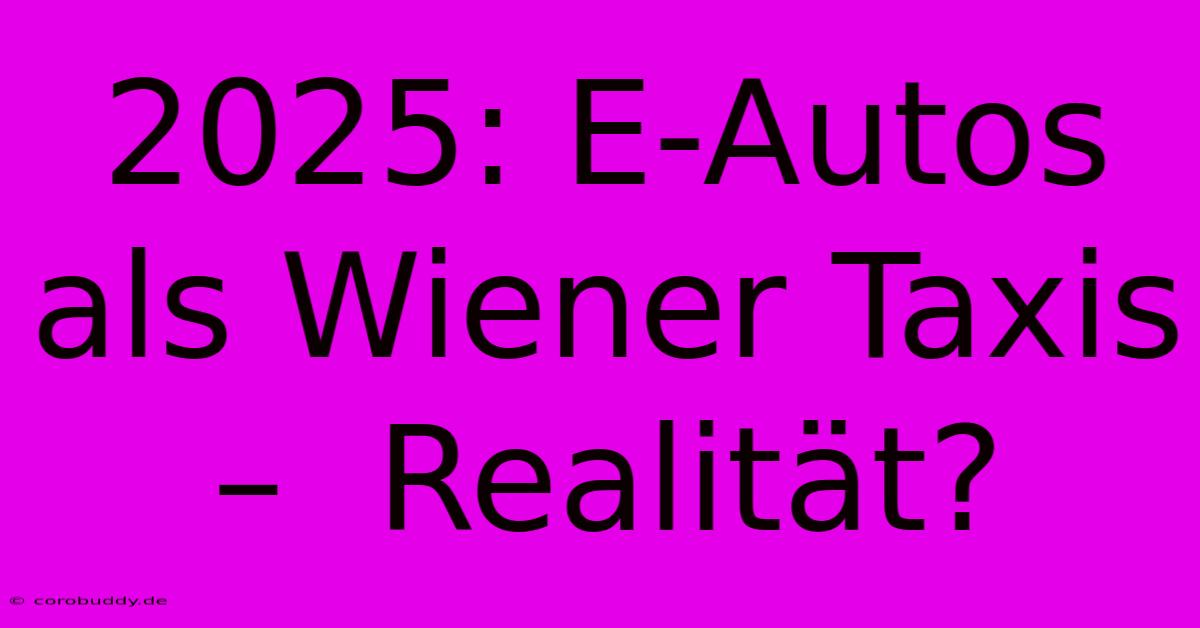2025: E-Autos Als Wiener Taxis – Realität?

Discover more detailed and exciting information on our website. Click the link below to start your adventure: Visit Best Website 2025: E-Autos Als Wiener Taxis – Realität?. Don't miss out!
Table of Contents
2025: E-Autos als Wiener Taxis – Realität?
Hey Leute! Let's talk about something that's been buzzing around Vienna – electric cars as taxis by 2025. Is it a realistic goal? Man, that's a tough question, and one I've been wrestling with for a while now.
I remember, back in 2018, I was in Vienna for a conference, and I was so impressed with the city's public transport. Seriously, the U-Bahn is amazing. But even then, I noticed a lot of taxis, and, well, let's just say most weren't exactly fuel-efficient.
So, the idea of a complete switch to electric taxis by 2025... it's ambitious, right? Ambitious, but maybe not impossible. I mean, we're talking Vienna here - a city known for its progressive thinking.
The Challenges: More Than Just Charging Stations
One big hurdle is charging infrastructure. Vienna needs a massive upgrade. We're not just talking about a few extra charging stations scattered around; we need a comprehensive network that can handle the sheer volume of taxi traffic. Think about it – how many taxis are constantly on the road, constantly needing to recharge? It's a huge logistical puzzle. I've seen reports suggesting Vienna is investing heavily in charging infrastructure, but is it enough? That's the million-dollar question.
Another thing to consider is the cost. Electric taxis are expensive. Switching an entire fleet over would require serious financial investment, and that means either higher fares or substantial government subsidies. And who's going to foot the bill? It's not exactly a straightforward answer.
Then there's the question of range anxiety. Even with improved battery technology, range remains a concern, especially for taxis that spend long hours on the road. What happens if a taxi runs out of charge mid-fare? That would be a nightmare for both the driver and the passenger. We need reliable, widespread charging to overcome this.
The Potential Benefits: Cleaner Air and a Quieter City
Okay, let's look at the bright side. Imagine Vienna in 2025 with a fleet of quiet, electric taxis zipping around. The air would be cleaner, the noise pollution reduced – a win-win for the environment and the citizens. That's a huge plus, and it aligns perfectly with Vienna's commitment to sustainability.
But, and this is a big but, the transition needs to be managed carefully. We can't just flip a switch and expect everything to work perfectly. There will be hiccups, delays, and unexpected challenges. A realistic transition plan is essential.
What Needs to Happen Before 2025?
To make this a reality, we need several key developments:
- Massive investment in charging infrastructure: This is non-negotiable. We need fast chargers everywhere, strategically placed to support taxi routes and reduce wait times.
- Government incentives: Subsidies for taxi drivers to switch to electric vehicles are vital. This could involve tax breaks, grants, or low-interest loans.
- Driver training and support: Drivers need training on how to operate and maintain electric vehicles. Support should also be provided to address any challenges they might face during the transition.
- Public awareness campaigns: Educating the public about the benefits of electric taxis will help build acceptance and encourage ridership.
So, 2025: E-Autos als Wiener Taxis – Realität? It’s a tall order, for sure. But with a well-executed plan, sufficient investment, and a collective commitment, it might just be possible. Fingers crossed! What do you think? Let me know in the comments!

Thank you for visiting our website wich cover about 2025: E-Autos Als Wiener Taxis – Realität?. We hope the information provided has been useful to you. Feel free to contact us if you have any questions or need further assistance. See you next time and dont miss to bookmark.
Featured Posts
-
Bitcoin 100 000 Wann Der Naechste Sprung
Nov 22, 2024
-
Path Of Exile 2 Early Access Start Trailer
Nov 22, 2024
-
K Frage Weil Unterstuetzt Entscheidung
Nov 22, 2024
-
Mette Marits Sohn Haftstrafe Kein Besuch
Nov 22, 2024
-
Handelsabkommen Madagaskar And Zlecaf
Nov 22, 2024
